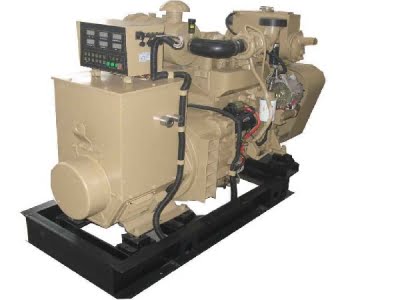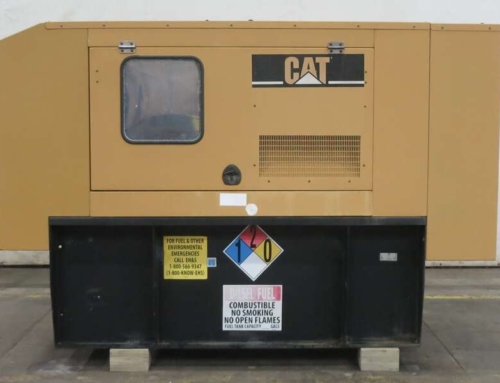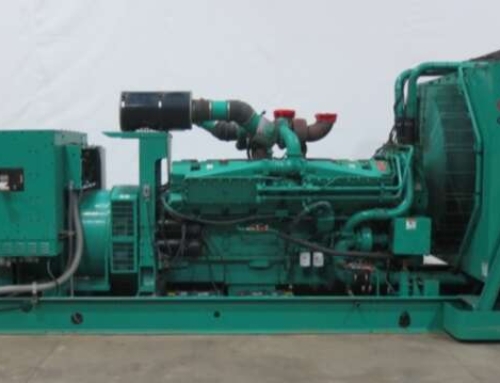While buying a diesel generator, people are usually worried about the high levels of noise. This is because there is a common notion that these equipment are noisy. However, this really depends on the frame of reference. If you’re comparing the noise generated from a gen-set to quiet place, then we have nothing to argue. Although, when compared to rocket launch noise a generator is actually pretty quiet. Read about how can you reduce diesel generator noise. However, we’re not here to debate, but we’re here to help.
Here are 5 ways to make your diesel generator quieter:
1. Distance
The easiest way to reduce the noise from a generator is to increase the distance between yourself and the place where the diesel generator is installed. When the generator is moved further away, the energy is spread over a greater distance, and therefore there is a decrease in acoustic intensity.
According to the general rule, when you double the distance, you can reduce the noise by 6dB.
However, if you have bought a used diesel generator for sale, consult the previous user – what steps they were taking to reduce noise, which will help you take better decisions.
2. Acoustic Barriers – Walls, Enclosures, Fencing
Solid surfaces restrict the transmission of noise by reflecting sound waves.
Installation of a generator in an industrial unit will ensure that the concrete walls act as acoustic barriers and limit the emanation of sound beyond that area. The achievement of exhaust noise reduction up to 10dB happens when the generator is inside standard generator canopies and enclosures. A bigger reduction of noise can happen when a portable generator is put in a custom-built enclosure.
Use acoustic fencing to create an extra barrier, if enclosures don’t help enough. Impermanent acoustic fencings are quick and effective solutions for construction assignments, utility networks as well as outdoor occasions. Installation of permanent and custom built acoustic screens will be helpful for larger installations.
Sometimes, simple maneuvers such as positioning the exhaust pipe vertically can help contain the noise level by ensuring that the sound is redirected upwards.
Use acoustic fencing to create an additional barrier if enclosures alone don’t do the trick.
3. Acoustic Insulation
Acoustic barriers reflect sounds waves and restrict noise only beyond the barrier. However, in order to reduce the noise, echo, and vibration within the generator enclosure/industrial room (also known as generator quiet box) you’ll need to insulate the space to absorb the sound.
Insulation involves lining hard surfaces with sound-absorbing materials or installing acoustic wall panels and tiles. Wall panels built from perforated steel are the usual choice for industrial applications, however, a variety of materials are also available and used.
Acoustic insulation, in addition to sound deflectors, can reduce sound of portable generators to a great extent
4. Anti-vibration Mounts (AVM)
Limiting the noise at source is another great way to reduce noise from your generator.
Setting anti-vibration mounts underneath the generator removes vibrations and decreases noise transmission. Anti-vibration mounts are available in a lot of different options. Some examples of such mounts are rubber mounts, spring mounts, spring mounts, and dampers. Your choice will depend on the amount of noise you need to achieve.
Along with insulating vibrations at the generator base, fitting flexible joints between the generators and connecting systems can help reduce generator noise transmission to surrounding structures.
5. Attenuators
For industrial generators, the most effective way of reducing noise transmission is through attenuators. It is a device that enables large amounts of air to pass through it but limits the transmission of noise.
Air swirls between the splitters which absorb the sound and reduces the wavelength. It is worth noting that an attenuation system can reduce sound to something between 50-90dB. And according to the general rule, great noise reduction can happen in a loud generator with a larger attenuator.
The above tips to reduce generator noise are perfect when you already have a noisy generator. You can also contact us to know more about keeping your diesel generator quieter. For what it’s worth, we can also help you buy a standby generator that does not produce so much noise. Our team can even install the generator such that the noise caused by the exhaust pipes is greatly reduced, appropriately for a noise-free environment.
Frequently Asked Questions About Generator Noise Reduction
How do you soundproof a generator enclosure?
Most generators produce a significant level of noise, which makes it essential that you place your generator in an enclosure and sound proof the same using sound absorbing materials. to do so, you can seal the edges of the enclosure with foil tape or acoustic caulk. This will help make the seams airtight, and reduce the noise by up to 20 decibels.
What is the overall noise level in a Portable Generator?
While portable generators prove to be ideal for use in areas with irregular power outages, they are known to create sound waves ranging between 60 and 90 decibels, which is rather loud. In some cases, these generators can produce sounds of up to 100 decibels. Hence, when using a portable generator, one must be prepared for high fuel consumption as well as comparatively more noise.
How quiet is a silent generator?
A silent generator, contrary to popular belief, isn’t completely silent. It usually operates at a noise level of up to 65 decibels, which is equivalent to the sound produced during a normal conversation between two people.







![Big Generators: How does it work? [with 7 Industrial Applications]](https://csdieselgenerators.com/wp-content/uploads/2023/06/commercial-operations-500x383.jpeg)